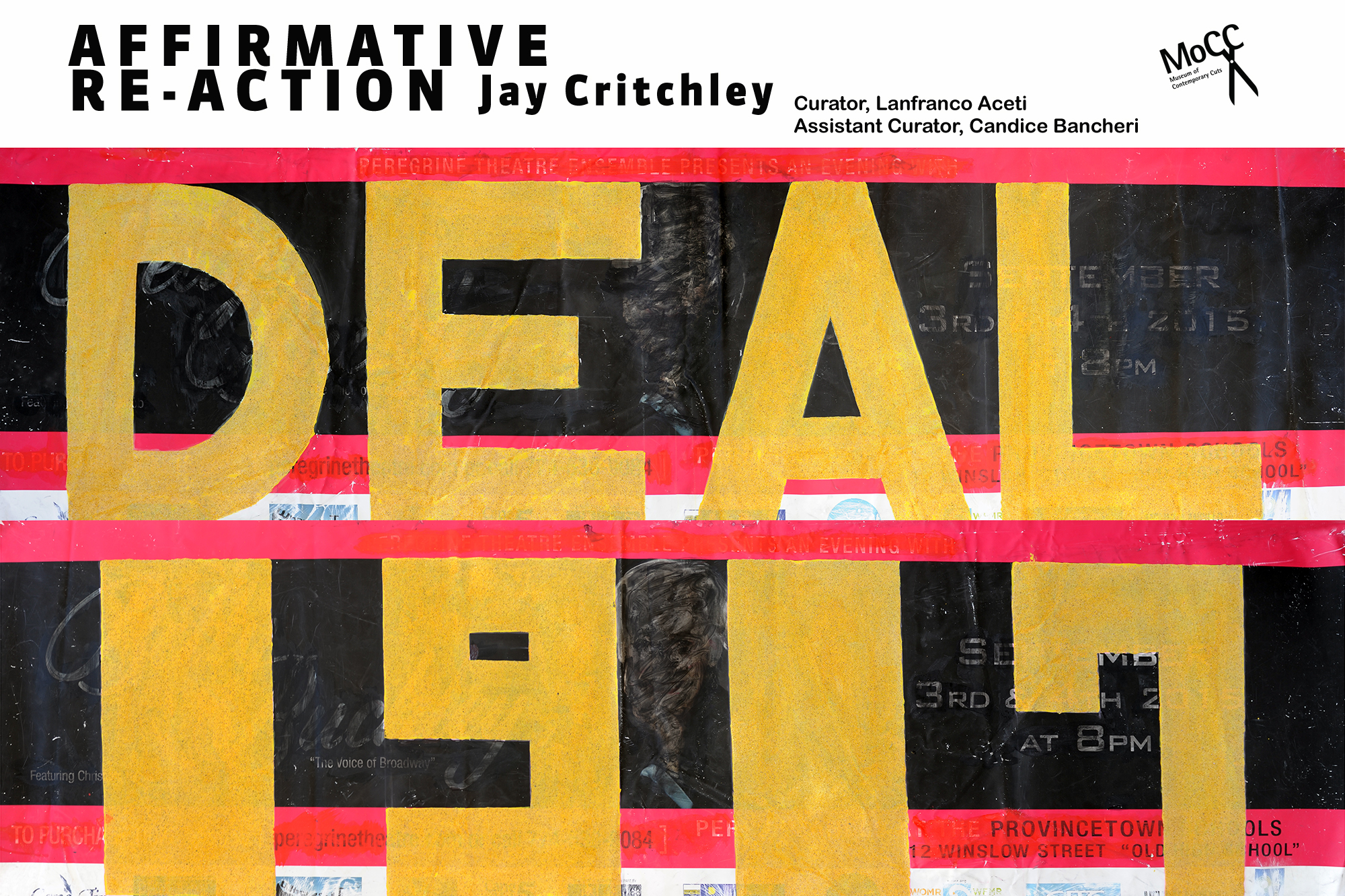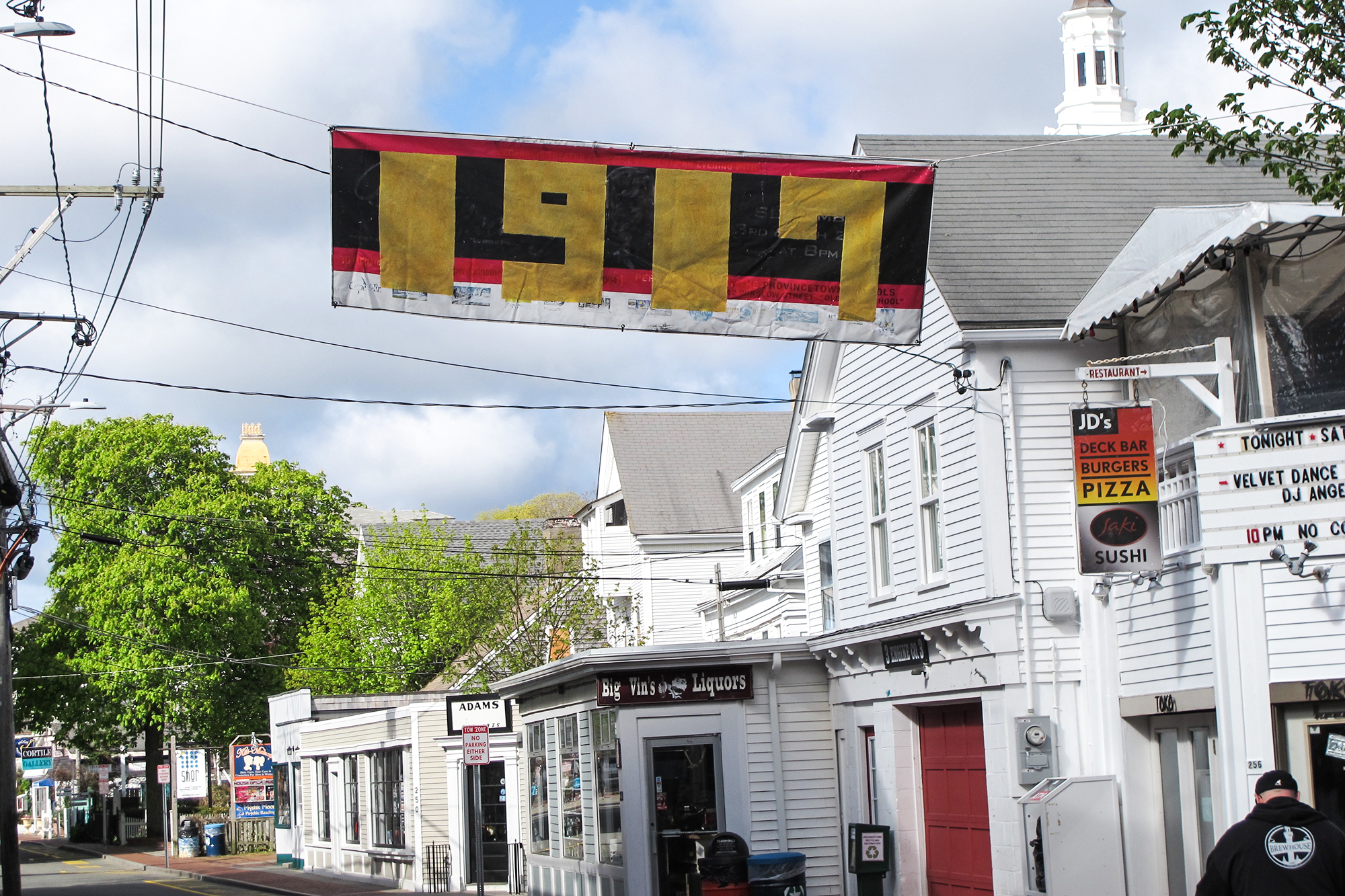Affirmative Re-Action, curated by Lanfranco Aceti and Candice Bancheri for the Museum of Contemporary Cuts, is the latest art project by American conceptual artist, Jay Critchley. Rooted in the long tradition of twentieth-century art, the artwork is a recycling and re-hanging of Provincetown’s historical street banners. These large plasticized banners announcing cultural events and/or displaying advertisements are a staple of contemporary society and towns the world over. Critchley gives them new life by covering them with paint and naturally colored sand. The new writings and the old announcements blend, creating an unusual object in which the understanding of the original event is subsequently distorted and has to be retraced.
Critchley’s works of art start from one very simple question and assumption. The artist asks, “ever wonder what happens to all that plastic that hangs over us on Commercial Street every summer—after the roses have faded and the event is over?” The honest reply should be: of course not! The majority of people no longer observe the quotidian mediocrity of the objects that surround them; an old banner is just that—an old banner. The reality of consumption is based on the negligent consideration for the costs of existence, via consumerism as a form of having in order to exist.
The artist’s aesthetic and works of art point to the opposite. His social interventions, activism, and conceptualizations are there to challenge the oblivious and act as a post-postmodern disruption of propaganda messaging and contemporary frivolity. His work is steeped in historical, cultural, and visual references obliging the viewer to retrace—in a contemporary archeological fashion—the aesthetic, meaning, and history of the object. The banners replicate the structure of something that is already there; thus anticipating a transformation that is a regression.
It is with this rediscovery process in mind—reconnecting historical events to their present histories concurrently being historicized and/or discarded—that the artist launches his first of a series of banners. Critchley’s choice in subject matter fell on Russia and the ‘new Cold War,’ in order to analyze the complexity of its historical relationship with the United States. Affirmative Re-Action unearths notions of domestic unease related to the potential of utopian and dystopian realities birthed by failing ideologies. One hundred years after the beginning of the Russian revolution in 1917, the strained relationship between the two ‘superpowers’—to use Cold War terminology—is now revealing the inadequacy of paradigms and dichotomies unable to respond to current challenges and crises. Nevertheless, Russia and the United States—as if trapped in a tried and true comedy of errors and horrors—continue to insist on forcing a straightjacket over the multifaceted condition that is the current post-postmodern socio-political disarray.
The concept for this first two-sided banner—8’ X 30”—is rooted in both the centennial of Provincetown’s historic, fecund decade: 1910-1920, and the new Cold War. Side one reads in large Russian constructivist numbers, “1917,” the year of the Russian Revolution and WWI; side two, reads the word, “DEAL.” Provocation, sarcasm, historical wit, and a conceptual approach to these works of art are mixed with a aesthetic modernist flair, which brings to mind the likes of Kazimir Malevich, Sergei Eisenstein, and George Orwell.
By recycling and recreating these discarded signs and re-hanging them over Commercial Street in Provincetown, Massachusetts, Critchley’s venture, the Affirmative Re-Action Project, disrupts the quotidian—providing a glimpse of ‘reality’ within a world of fakes and fakers. The first banner, redesigned and re-fashioned with paint and naturally colored sand, will be installed from May 10th to May 31st near the Provincetown Town Hall.
If you wish to contribute to the artwork, the artist will be accepting donations of old street banners from businesses for his Affirmative Re-Action Project. You can contact him through his website: https://www.jaycritchley.com/contact.html
You can also check out this video interview with Jay Critchley for the Black Sheep Talks of the Museum of Contemporary Cuts.
Artist Biography
Jay Critchley’s visual, conceptual, and performance work in conjunction with his environmental activism have traversed the globe, showing and/or performing in Argentina, Japan, England, Holland, Germany, Columbia and the United States. He was featured in the LOGO channel’s “Ptown Diaries”, and interviewed by BBC/UK. His solo exhibition at Freight + Volume Gallery in Chelsea, New York City received exciting reviews from the New York Times, The New Yorker, and the Village Voice.
A longtime Provincetown, Cape Cod, MA resident, he utilizes the town, landscape, harbor, beaches, and dunes as his medium. He founded the patriotic Old Glory Condom Corporation, which won a controversial three-year legal battle for its US Trademark. He produced, wrote, and directed several movies and documentaries, including: Toilet Treatments which received the HBO Audience Award at the Provincetown International Film Festival; The Beige Motel project which involved encrusting a 1955 iconic, roadside motel in sand— appearing as “an A-frame with wings” before it was demolished.
Jay’s social art practice includes running the Provincetown Community Compact, which works with artists and the environment, and sponsors the annual Provincetown Harbor Swim for Life & Paddler Flotilla, a fundraiser for AIDS and women’s health, founded in 1988.


